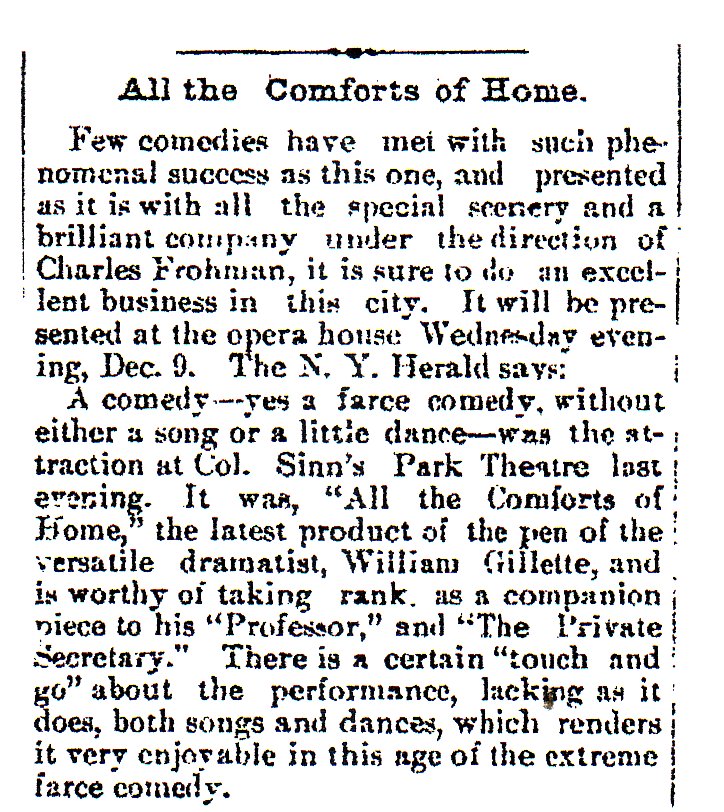
All The Comforts of Home
The play opened September 8, 1890 at Proctor's 23rd St. Theatre. The play was a comedy by William Gillette. Maude Adams played Evangeline Bender.
“Maude's performance as Evangeline Bender drew a surprising amount of critical priase, considering the minor nature and mediocre quality of the role....It was Maude's personal charm which rounded out the flat character and intrigued the critics.” (Maude Adams, an American Idol: True Womanhood Triumphant in the Late-Nineteenth and Early-Twentieth Century Theatre, doctoral thesis, 1984, Eileen Karen Kuehnl)
From the book Charles Frohman:" Manager and Man by Issac F. Marcosson and Daniel Frohman, with an Appreciation by James M. Barrie. 1916:
Charles immediately launched himself on another sea of productions. The most important was Gilette's "All the Comforts of Home," which he put on at Proctor's Twenty-third Street Theater. Frohman had just acquired the lease of this theater. Already a big idea was simmering in his mind, and the leasehold was essential to its consummation. On May 8, 1890, he produced the New Gilette play, which scored a success. Charles Frohman:" Manager and Man by Issac F. Marcosson and Daniel Frohman, with an Appreciation by James M. Barrie. 1916
This production marked another one of the many significant epochs in Frohman's life because it witnessed the first appearance of little Maude Adams under the Charles Frohman management.
While trying "All the Comforts of Home" on the road there occurred an amusing episode. Frohman, who had been watching the rehearsals very carefully, said to Henry Miller, who was leading man:
"Henry, you are something of a matinee idol. I think it would help the play if you had a love scene with Miss Adams."
Accompanied by Rockwood, Frohman visited Gilette at his home at Hartford, got him to write the love scene, and then went on to Springfield, Massachusetts, for the try-out."
That night the three assembled in the bleak drawing-room of the hotel. Frohman ordered a little supper of ham sandwiches and sarsaparilla, after which he rehearsed the love scene, which simply consisted of a tender little parting in a doorway. it served to bring out the wistful and appealing tenderness that is one of Maude Adam's great qualities.
=====A History of the Theatre in America from Its Beginnings to the Present Time Vol. 2 by Arthur Hornblow; J.B. Lippincott Company, 1919=====
Now firmly established as a producing manager, Charles Frohman took a lease of Proctor's Twenty third Street Theatre and opened there September 8, 1890, with a new play by William Gillette called "All the Comforts of Home." In this play, Maude Adams, who played the rle of Evangeline Bender, made her first appearance under Charles Frohman's management.
=====The Gay Nineties in America: A Cultural Dictionary of the 1890s by Robert L. Gale; Greenwood Press, 1992=====
Gillette, William ( 1853- 1937). (Full name: William Hooker Gillette.) Actor and playwright. Born in Hartford, Connecticut, he was the handsome son of a U.S. senator from Connecticut who was one of the founders of the Republican Party. Against family wishes, Gillette became an actor, first in New Orleans and then in Boston ( 1875). He became a successful playwright when he wrote and took the title role in The Professor (opening in New York, 1881). Ultimately he wrote or adapted twenty plays, which were usually melodramatic or farcical; he performed in nine of them. Two of his most memorable plays concern the Civil War: Held by the Enemy (Brooklyn, 1886), the first successful play about the Civil War; and Secret Service* ( Philadelphia, 1896), Gillette's best work, which he took to London ( 1897) and which was also produced by others in Paris. Other Gillette plays in the 1890s include All the Comforts of Home ( Boston, 1890), about a man who thinks the hero loves his wife, but the hero really loves the man's daughter; Mr. Wilkinson's Widows ( Washington, D.C., 1891), a farce about bigamy; Settled out of Court ( New York, 1892), another farce; Too Much Johnson (Holyoke, Massachusetts, 1894), a philanderer farce; Because She Loved Him So ( New Haven, Connecticut, 1898), about real and feigned jealousy; and finally Sherlock Holmes ( Buffalo, 1899), based on Sir Arthur Conan Doyle's character (and including Dr. Watson and Moriarty) but mostly Gillette's plotting, about mysterious documents sent by German royalty to a woman now dead. Gillette created the public's permanent notion of the immortal detective--an observant, hawk-faced man, smoking an oversized pipe and wearing a hunter's flapped cap. Gillette enjoyed great success in this role in the United States and in England ( 1899-1903).
Reviews
p>The New York Times of Sept. 9, 1890, called her a “winsome actress...Her assumption of mock gravity as delightful.”
The Dramatic Mirror of Sept. 13, 1890, thought her “captivating and sentimental.”
“Miss Maud Adams was somewhat out of place in such a whirlwind piece, her pensive and delicate ingenue talents being worthy of something a little more serious.” The World, Sept. 9, 1890.
 Cast listing |
 The Lima Daily Times, Dec. 7, 1891 |
|